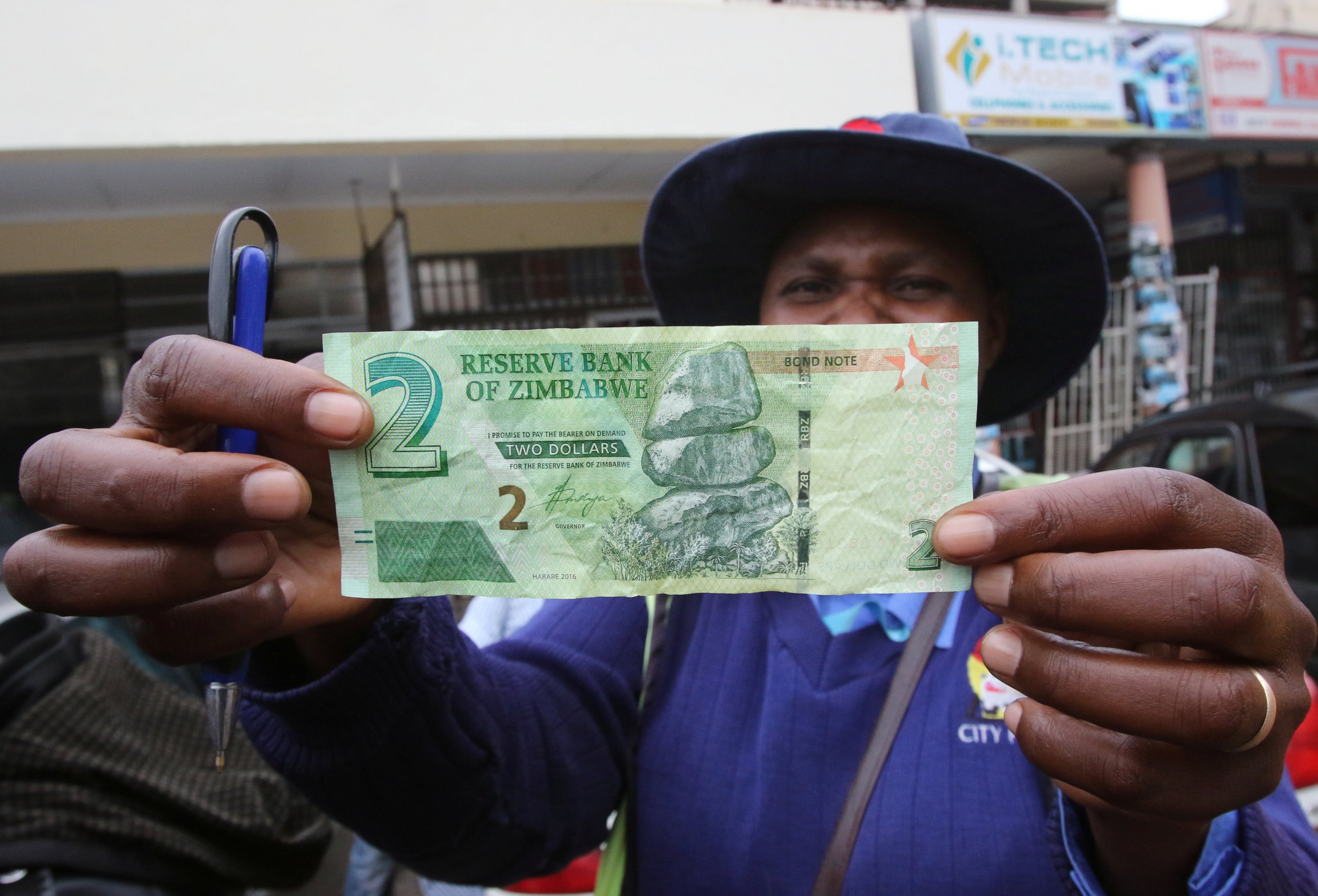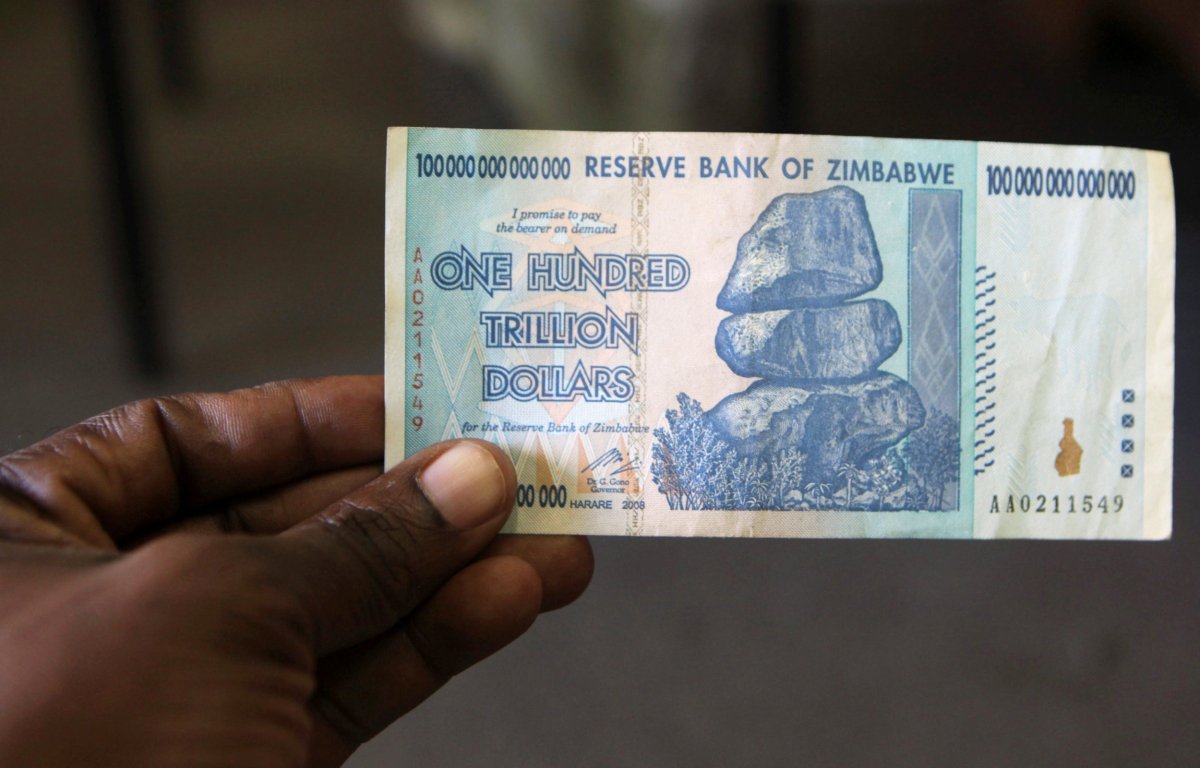
Zimbabwe has a new currency. Well...sort of.
The Reserve Bank of Zimbabwe released the first tranche of notes for a new pseudo-currency called bond notes on Monday. A $10 million batch of two and five dollar bond notes are now legal tender within the Southern African country, which has been hit by a crippling cash shortage that has seen long queues form outside banks.
For many Zimbabweans, however, the printing of new money brings back harrowing memories of the country's hyperinflationary era of 2008-09, when inflation reached more than 200 million percent and the Zimbabwean dollar became worthless.
What are bond notes?
Bond notes are a parallel currency that Zimbabwe's government, led by veteran president Robert Mugabe, has introduced to deal with a cash shortage and boost exports. According to the reserve bank, bond notes have an official exchange rate of 1:1 with the U.S. dollar, which has been the main currency used in Zimbabwe since 2009. The country already has several million U.S. dollars' worth of bond coins, to which the notes will be added.
What currency does Zimbabwe use?
Following the collapse of the Zimbabwean dollar, which was abandoned in 2009, the country switched to a multi-currency system. At least nine currencies are now legal tender in Zimbabwe: the U.S. dollar, the South African rand, the euro, the British pound, the Australian dollar, the Botswana pula, the Japanese yen, the Indian rupee and the Chinese yuan. Not all are accepted by Zimbabwean traders, however, with the U.S. dollar being the most widely-used currency. Bond notes are now being added to this confusing mix.
Why is the government introducing bond notes?
Zimbabwe is a net importer of goods—the country exported $2.5 billion worth of goods in 2014 and imported $6.25 billion, resulting in a negative trade balance of $3.4 billion. Consequently, U.S. dollars have been leaving the country at a greater rate than they've been coming in, resulting in a cash shortage. Zimbabwe cannot address the deficit by requesting a loan from international lenders, such as the World Bank or International Monetary Fund—both institutions have suspended their lending plans to the country due to its failure to implement economic reforms aimed at clearing arrears.
The reserve bank is hoping to boost exports by offering a bonus of $5 in bond notes per $100 of exports. It is also limiting withdrawals to $50 per day and $150 per week in a bid to stop the pseudo-currency losing its purported 1:1 value with the U.S. dollar.

What happened to the Zimbabwean dollar?
The introduction of bond notes has raised the specter of hyperinflation among many Zimbabweans, for whom the memory of the collapse of the Zimbabwean dollar is still fresh. The currency collapsed in the mid-2000s after decades of economic mismanagement under Mugabe, whose policies including the forced redistribution of land from white farmers to black Zimbabweans with little agricultural training.
Inflation reportedly peaked at around 90 sextillion percent—or nine followed by 22 zeros—and the government redenominated the currency three times, lopping zeros off the end in a vain bid to stabilize the skyrocketing inflation. The price of daily essentials, such as a single egg or a loaf of bread, was north of 1 billion Zimbabwean dollars. Eventually, the government abandoned the currency in 2009, switching to the current multi-currency basket.
How have Zimbabweans reacted?
Some business groups in Zimbabwe have been positive about a new form of liquidity being introduced to the financial system. But opposition parties and civil society groups have loudly denounced the new pseudo-currency and are planning further protests against the new legal tender. Veteran opposition leader Morgan Tsvangirai wrote in Newsweek in October that Mugabe's government was exacerbating Zimbabwe's economic crisis by printing bond notes, which were being "rejected by the people."
Uncommon Knowledge
Newsweek is committed to challenging conventional wisdom and finding connections in the search for common ground.
Newsweek is committed to challenging conventional wisdom and finding connections in the search for common ground.
About the writer
Conor is a staff writer for Newsweek covering Africa, with a focus on Nigeria, security and conflict.
To read how Newsweek uses AI as a newsroom tool, Click here.








